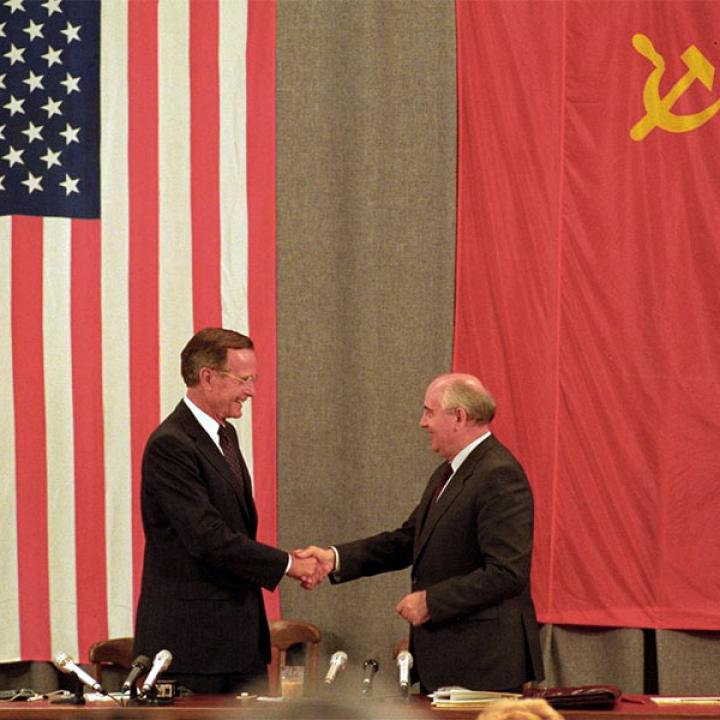
- Policy Analysis
- Articles & Op-Eds
Dennis Ross Reflects on George H. W. Bush

Looking back at the late president’s ability to navigate watershed moments in geopolitical history with remarkable diplomatic skill, empathy, and civility.
George H. W. Bush was a politician, statesman, and leader, and I had an interesting vantage point on how he wore each of those hats. I came to know him when he was vice president and I was serving on the National Security Council staff. Even though I was a Democrat, he asked me to leave the NSC and serve as the foreign policy advisor to his 1988 campaign for the presidency—a position I would assume on August 1, 1988, only three months before the election. This was not the era of perpetual campaigning, nor was it a time of deep political polarization. After he was elected, I became director of the Policy Planning Staff in the State Department, and James Baker asked me to join him when he left as secretary of state and went to the White House in August 1992 to try to rescue President Bush’s reelection bid.
Bush tended to divide the world between politics and policy. When Baker told Bush he wanted to bring me with him to the White House in summer 1992 to help on the campaign—not as a foreign policy advisor but to help him run the entire political effort, he asked, “Why Dennis? He's a professional.” Bush did what he had to politically, but always tried to wall off national security decisions from domestic policy concerns. One might think that naive or even quaint given today’s realities, but President Bush had a very strong code of what was right, what was proper. National security decisions should be guided by our interests as we defined them and not by how it might play politically.
When he said Saddam Hussein’s absorption of Kuwait “would not stand” four days after the Iraqi invasion, it was not politically popular—and he would face real domestic opposition as we moved toward the use of force, winning congressional support by a small margin. But for him this was a test of the post-Cold War world; would it be characterized by the law of the jungle or by international norms? He was determined that it should be the latter.
He had a grasp of history and great experience, having served as head of mission in China and director of the CIA in addition to eight years as vice president. That experience gave him an instinctive feel for how to deal with other leaders.
Partly because of that, but also because he tended to look at the needs of others, he was very explicit in telling us there would be no gloating when the Berlin Wall came down. He did not want to put Mikhail Gorbachev in the corner, understanding that would make it harder for him to accept what Bush anticipated would be difficult for the Soviets: the unification of Germany in NATO. To avoid the traumas of the past in Europe, Bush strongly believed that a unified Germany needed to be in NATO. Unification could not be thwarted lest it breed deep resentments in Germany. Yet Bush also understood that Germany must not become an object of competition between the blocs; nor could it be neutral and thus in need of nuclear weapons to ensure its own security.
At the time, few observers believed it was possible to get the Soviets as well as the British and French (who also harbored fears of a newly strengthened Germany) to accept an outcome in which a unified Germany would be integrated into NATO. But Bush and Baker would pull it off—framing the objective in a way that had all others reacting to it and engaging in intensive diplomacy that addressed the needs and concerns of all parties even as they built irresistible momentum behind their efforts.
This was very much the norm for Bush, focusing on how to mobilize others to support our objectives and thus give them far greater legitimacy and weight internationally. America came out first by being mindful of the interests and needs of others and never denying them the political space they needed to make hard decisions to support us.
Not surprisingly, his personal attributes helped him with other leaders. If he made a commitment, his allies and adversaries knew they could count on it. King Fahd of Saudi Arabia was initially nervous about accepting American forces into the kingdom after the Kuwait invasion—as the Custodian of the Two Holy Mosques, making such a decision could imply that he needed “non-believers” to protect the government on Saudi soil. Yet Bush’s promise that we would leave as soon as we reversed the Iraqi aggression was good enough for the king.
His word was trusted. He exuded decency and civility. Foreign leaders understood and felt that, and so did his domestic political opponents. He might play hardball at times politically, but he did not demonize his opponents—and when he was attacked politically at home, I was always struck by how he did not take the attacks personally.
George H. W. Bush believed in the decency of America and its people, and he felt he owed the country much. He felt public service was both an honor and a duty. After he lost the 1992 election, he wrote me a note thanking me for all my good work in the administration but also urging me, if asked, to stay on with the incoming Clinton administration—that, he said, would also honor my work for him.
Dennis Ross, the William Davidson Distinguished Fellow at The Washington Institute, served in senior national security positions in the Reagan, Bush, Clinton, and Obama administrations.


